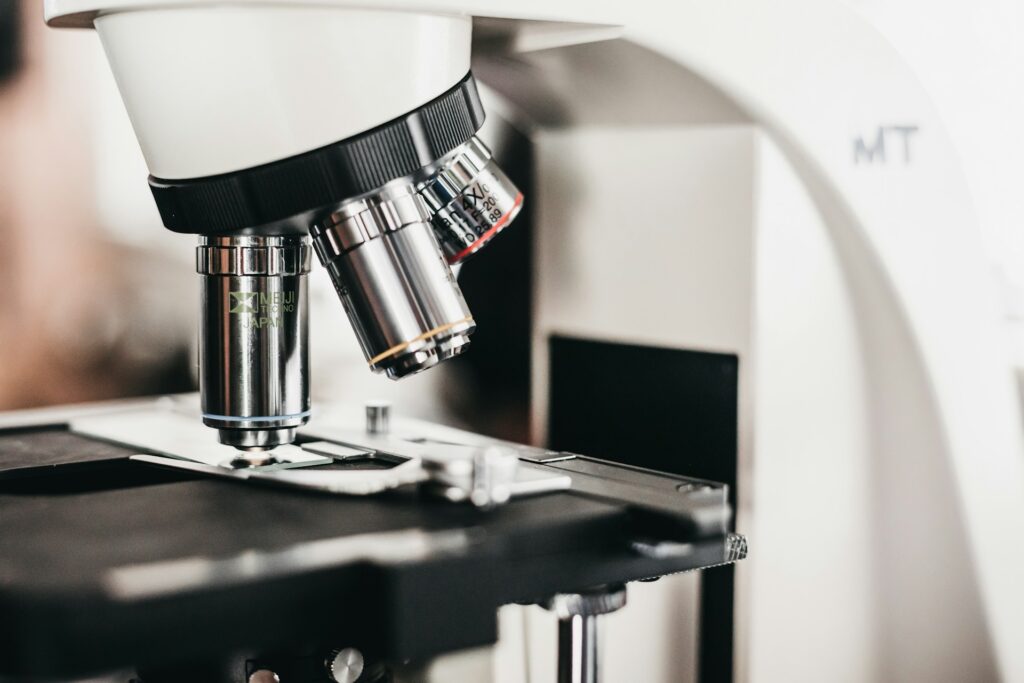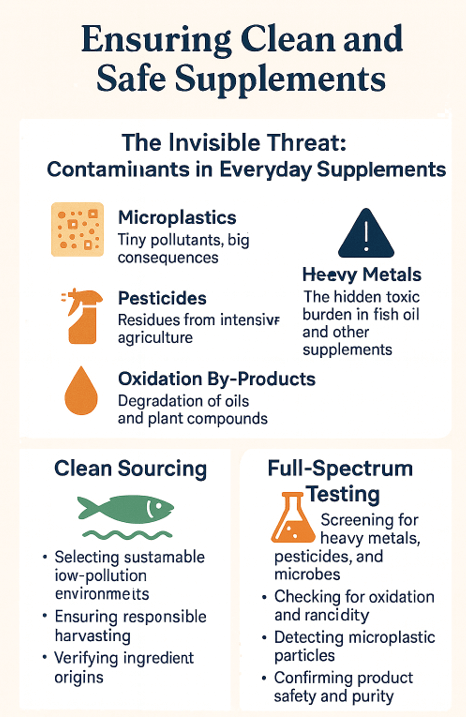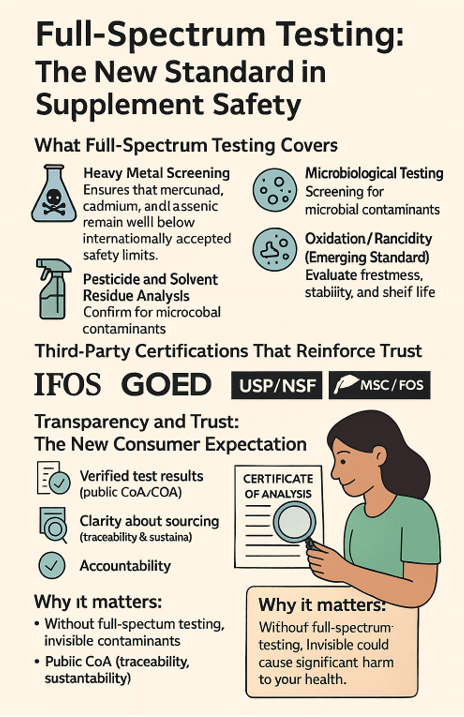
Authors (from our MVS Pharma team): Riya Jayapal Roja – Senior Pharmacist & Dr Disha Trivedi – PhD in Molecular Genetics and Biotechnology
Introduction
In recent years, the supplement industry has undergone a profound transformation. Once defined primarily by how much of an ingredient a product contained—milligrams of omega-3, grams of protein, or standardized percentages of botanical extracts—the focus has shifted toward how clean and safe those ingredients truly are.
Today’s health-aware consumers and practitioners are no longer satisfied with vague claims like “pharmaceutical grade” or “premium quality.” They expect proof of purity, transparent sourcing, and scientific verification that the supplements they take are free from harmful impurities.
From omega-3 fish oils and herbal extracts to protein powders and vitamins, supplements are now subject to increasing scrutiny. Emerging research and independent testing have revealed that many products—even those marketed as “natural” or “high-quality”—may contain invisible contaminants, including:
- Microplastics from polluted oceans and packaging residues
- Heavy metals such as mercury, lead, and arsenic absorbed from soil and water
- Pesticide residues from intensive agriculture
- Oxidation by-products formed when oils or plant compounds degrade over time
These contaminants may exist in trace amounts, but chronic exposure can compromise both human health and public trust in the supplement industry.
That is why a new standard has emerged—one that values clean sourcing and full-spectrum testing as essential pillars of supplement safety. Clean sourcing ensures that ingredients come from responsible, sustainable, and low-pollution environments, while full-spectrum testing verifies that each finished product is free from toxins, pathogens, and degradation products.
Together, these practices mark the evolution of the modern supplement era: one driven not by marketing promises, but by measurable purity, scientific accountability, and transparent integrity. The goal is no longer just to deliver nutrients—it is to deliver trust, safety, and sustainability in every capsule, soft gel, or scoop.
The Invisible Threat: Contaminants in Everyday Supplements
Microplastics — Tiny Pollutants, Big Consequences
Microplastics—minute plastic fragments typically smaller than 5 millimeters—have infiltrated nearly every corner of our environment, from oceans and soil to the very air we breathe. Marine-derived supplements such as fish oil, krill oil, and seaweed extracts are especially at risk of contamination.
Once inside the body, these microscopic particles can:
Induce oxidative stress and chronic inflammation
Transport harmful endocrine-disrupting chemicals like BPA and phthalates
Accumulate in tissues, potentially disrupting gut balance and immune defenses
Even high-end supplements may harbour trace microplastic residues if not subjected to advanced purification and full-spectrum testing.
Heavy Metals — The Hidden Toxic Burden in Fish Oil and Other Supplements
Heavy metals such as mercury, lead, cadmium, and arsenic are naturally present in the environment, but industrial pollution has significantly increased their concentration in soil and water. These contaminants can easily accumulate in marine sources like fish oil, as well as in botanical and mineral-based supplements.
Even low-level, long-term exposure to these toxic elements has been associated with serious health risks, including:
Neurological and kidney damage
Cardiovascular and reproductive disorders
Impaired child development and learning deficits
Given these risks, comprehensive heavy metal testing is no longer optional—it’s an essential quality standard for any reputable supplement manufacturer committed to safety and transparency.
Clean Sourcing: Where Purity Truly Begins
Clean sourcing goes beyond cost or convenience—it’s about selecting responsible, transparent, and sustainable ingredient origins. Every high-quality supplement starts with clean raw materials, making sourcing the cornerstone of both human health and environmental integrity.
Marine Ingredients: From Ocean to Capsule
When it comes to fish oil and other marine-based nutrients, the purity of the final product begins with the purity of the ocean. Trusted manufacturers source fish from cold, deep, and less-polluted waters, such as those in the North Atlantic or Antarctic regions, where natural contaminant levels are significantly lower.
To further ensure quality and safety, reputable producers apply advanced purification and sustainability standards, including:
Molecular distillation — to effectively remove heavy metals, PCBs, and other environmental toxins.
Certified fisheries — such as those approved by the Marine Stewardship Council (MSC) or Friends of the Sea, guaranteeing sustainable harvesting and ecological balance.
In essence, clean sourcing isn’t just a label—it’s a commitment to producing supplements that are safe for consumers and respectful of the planet.
Plant-Based and Herbal Extracts
Botanical and herbal ingredients should be cultivated in clean, pesticide-free environments—ideally from organic or regenerative farms.
Trustworthy manufacturers go beyond basic sourcing claims: they verify soil integrity, monitor water purity, and ensure that no synthetic chemicals are used throughout cultivation.
Such transparent and traceable plant sourcing not only safeguards human health but also promotes ecological sustainability and biodiversity.

Full-Spectrum Testing: The New Standard in Supplement Safety
Traditional quality control often stops at measuring potency—confirming that a supplement contains the stated amount of active ingredients. While important, potency alone doesn’t guarantee safety. True product integrity requires full-spectrum testing, a comprehensive approach that examines every potential contaminant and stability factor from source to shelf.
What Full-Spectrum Testing Covers
Heavy Metal Screening: Ensures that mercury, lead, cadmium, and arsenic remain well below internationally accepted safety limits.
Microbiological Testing: Detects contamination from bacteria, yeast, or mold, preventing hidden health hazards.
Pesticide and Solvent Residue Analysis: Confirms that extraction and purification processes are clean, minimizing chemical exposure.
Oxidation and Rancidity Checks (for oils): Evaluate freshness, stability, and shelf life, especially critical for omega-3 and other lipid-based products.
Microplastic Detection (Emerging Standard): Uses advanced spectroscopy and filtration technologies to identify trace plastic particles increasingly found in marine-derived supplements.
- Third-Party Certifications That Reinforce Trust
Independent verification is essential for consumer confidence. Leading certifications validate both product safety and ethical sourcing:
IFOS (International Fish Oil Standards): Evaluates fish oils for purity, potency, and oxidation stability.
GOED: Confirms compliance with rigorous global omega-3 quality benchmarks.
USP, NSF, Consumer Lab: Verify label accuracy, purity, and the absence of harmful contaminants.
MSC / ASC: Ensure sustainable, traceable marine sourcing that protects ocean ecosystems.
When consumers see these trusted seals—or access a Certificate of Analysis (CoA)—they gain assurance that the product meets internationally recognized standards for purity, safety, and transparency.
Transparency and Trust: The New Consumer Expectation
Today’s consumers are informed, analytical, and discerning. Marketing buzzwords like “pharmaceutical grade” or “ultra-pure” are no longer enough to earn their confidence. People now expect proof, not promises.
Modern buyers actively look for:
Verified test results — publicly accessible lab reports and Certificates of Analysis (CoA).
Clarity about sourcing — including sustainability, origin, and manufacturing processes.
Accountability — how brands respond when safety or quality concerns arise.
Brands that embrace radical transparency—sharing detailed testing data, certifications, and sourcing information—build long-term trust and loyalty. In contrast, companies that rely on vague claims or withhold information risk losing both credibility and consumers.
Why This Matters: Health, Planet, and Integrity
Clean sourcing and full-spectrum testing are more than technical requirements—they reflect a brand’s values and ethical responsibility. Together, they safeguard:
Human health: Preventing chronic exposure to invisible contaminants and toxins.
Environmental ecosystems: Promoting responsible fishing, sustainable harvesting, and reduced industrial waste.
Consumer confidence: Strengthening trust through science, transparency, and verified safety.
When supplement safety aligns with environmental stewardship and scientific integrity, it creates a powerful win-win: healthier people and a healthier planet.

Conclusion
From microplastics to heavy metals, the invisible contaminants circulating in our modern environment are reshaping the way supplements are sourced, tested, and trusted. No longer can manufacturers rely on marketing claims or milligram counts alone to earn consumer confidence. In today’s world, safety and transparency are the true indicators of quality.
Clean sourcing ensures that purity begins at the very origin—whether that’s fish harvested from clean, cold waters, plants cultivated in toxin-free soil, or algae grown in controlled, contaminant-free environments. This step forms the ethical and scientific foundation for supplement safety, preventing pollutants from ever entering the product chain.
Full-spectrum testing, on the other hand, safeguards the final product. It verifies that each capsule, powder, or oil is free from heavy metals, microplastics, oxidation by-products, and other hidden toxins that could compromise health. Independent third-party verification—through certifications like IFOS, GOED, or USP—transforms this process from a promise into proof.
Fish oil offers one of the clearest examples of why these standards matter. As a marine-derived supplement, it is especially vulnerable to environmental pollution. Only products that undergo molecular distillation and rigorous third-party testing can guarantee that their omega-3 content is pure, stable, and free of contaminants such as mercury, PCBs, or microplastics. In this way, responsibly sourced and well-tested fish oil doesn’t just support heart and brain health—it also represents the gold standard of safety, sustainability, and scientific integrity.
Together, clean sourcing and full-spectrum testing are redefining what supplement quality means. Purity is no longer assumed—it is proven. For both consumers and healthcare practitioners, the safest supplement isn’t the one that shouts the loudest about potency or performance, but the one that demonstrates its purity, transparency, and trustworthiness at every step—from raw ingredient to finished product.
In the evolving world of nutrition and wellness, this marks a critical shift: the future of supplement safety lies not only in what a product delivers—but in what it keeps out.






